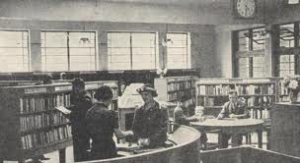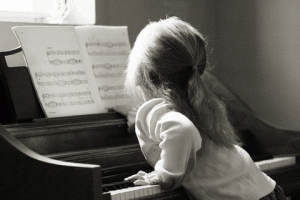Margaret Perry (b. 1922): Reading & Writing

It is clear that Perry (born 1922, in Nottingham) was exposed to reading from an early age, being both an individualised and social activity. Although Perry’s own mother was raised in working class poverty, Perry notes how she, ‘sat down regularly at 2pm everyday with her book … read through the evening till bedtime’ (pp. 9). Perry also highlights the importance of libraries for the working class acquisition of literature, e.g., ‘the public library … had a job to keep her supplied with current publications’ (pp. 9). Perry would go to the ‘silent films and later to the “talkies”’ (pp. 15), however no other forms of media are really referred to. Perhaps this is due to the fact that, with her memoir being written in the 1970s, Perry felt no need to highlight their obvious presence.
Perry applies her knowledge of Gothic literature, ‘the Jekell and Hyde game’ (however misspelt, pp. 13), in reminiscing about an aggressive school teacher. She was taught Shakespeare at school, mentioning in particular A Midsummer Night’s Dream and The Merchant of Venice. These canonical texts possess certain escapism through their fantasy elements, such as dualism and fairies, contributing to their appeal to an adolescent Perry. Also, to highlight that she enjoyed period literature portrays cultural capital. James Hinton expressed the view that members of the working class were 'anxious to deploy a taste for high culture as a means of distinguishing themselves from their self-assigned class’(1), and this could certainly be applied to Perry in her wish to 'better herself' (pp. 24). Perry could also read sheet music because of piano lessons, another aspect of her cultural capital through reading, and this made her top of the class in music.
Despite Perry’s social class, I am positive that the literary influences in her life contributed to her decision to write an eloquent memoir, making readers out of her audience. There is definitely something of the autodidact with Perry, realising early that education allowed for class emancipation.
Footnotes:
(1) Hinton, James. ‘The “Class” Complex’: Mass-Observation and Cultural Distinction in Pre-War Britain’, Past and Present, no. 199, May, 2008
(2) Rose, Jonathan, ‘Rereading the English Common Reader: A Preface to a History of Audiences.’ Journal of the History of Ideas. 53. 1 (1992): 47-70 pp. 51
References:
Bourdieu, P, Distinction: A Social Critique of the Judgement of Taste (Cambridge: Harvard University Press, 1984)
Bourke, J, Working-Class Cultures in Britain 1890-1960: Gender, Class and Ethnicty (London: Routledge, 1994)
Feely, Catherine. ‘From Dialectics to Dancing: Reading, Writing and the Experience of Everyday Life in the Diaries of Frank P. Foster’, History Workshop Journal, 69 (2010) 91-110
Perry, Margaret, Untitled, TS, pp.38 (c.13,000 words). Extract in J. Burnett (ed.), Destiny Obscure: Autobiographies of childhood, education and family from the 1820s to the 1920s (London: Allen Lane, 1982), pp.319-24 (2.606)
Perry, Margaret, Family Life in the Royal Air Force and Later (London: Serendipity Publishing, 2006)
Vincent, David. Literacy and Popular Culture: England 1750-1914. (Cambridge: Cambridge UP, 1989)
Vincent, David. Bread, Knowledge and Freedom: A Study of Nineteenth-Century Working-Class Autobiography (London: Methuen, 1981)
Webb, R.K. The British Working Class Reader, 1790-1848: Literacy and Social Tension. London: George Allen & Unwin Ltd., 1955
Online Resource:
Intrigued to know what other texts were being consumed in the past? Look no further than The Reading Experience Database, 1450-1945:
To look at area-specific newspapers (unlike Perry!), then check out this handy site:


Leave a Reply